The Latest News and Updates
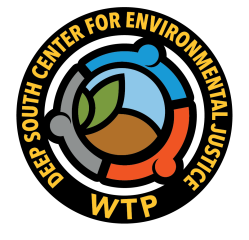
May 16, 2023
Deep South Center for Environmental Justice Celebrates Environmental Career Worker Training Graduation
For Immediate Release May 16, 2023 Contact: vkeys@skdknick.com Deep South Center for Environmental Justice Celebrates Environmental Career Worker Training Graduation New Orleans, LA – The Deep South Center for Environmental Justice (DSCEJ) is pleased to celebrate the graduation of the Spring 2023 Environmental Career Worker Training Program (ECWT) class. This program focuses on delivering comprehensive training to disadvantaged and underrepresented minority workers who have not historically had access to environmental career training. The goal of the program is to diversify the field with an increasing number of people from communities disproportionately impacted by environmental injustice. Over the course of 12 weeks DSCEJ trainers use their knowledge and expertise in the areas of environmental, occupational and health, safety, and emergency and disaster preparedness and response to prepare 25 trainees across three sites, New Orleans (lead site), Houston and Pensacola. The training is split into two parts, basic skills training and technical training. The basic skills training provides trainees with the personal and interpersonal skills including study skills, mathematics, an introduction to hazardous materials, computer basics, life skills, job readiness, and physical fitness. There is also a counseling component and information on a wide range of social services to aid them in achieving their educational and vocational goals. The technical training includes certificates in construction, weatherization, hazardous waste worker, mold remediation, an OSHA construction or general industry card and state of Louisiana lead and asbestos abatement worker accreditation. DSCEJ also assists the graduates with job placement, upon successful program completion; the average job placement rate is 98% with average earnings of $17 - $20 per hour. In New Orleans the training staff is comprised of DCSEJ Technical Training Director, Kim Dunn Chapital, Bruce McClue, Technical Training Manager, and Dr. John Warford, ECWT Program Manager and Assistant Director for Training and Operations. Dunn and McClue are seasoned veterans in this work. “We are thrilled to congratulate the 28th class of EC graduates. This program is a critical part of our efforts to expand the capacity of leaders who can drive solutions to the climate crisis that is disproportionately affecting the communities they live in,” said Dr. Wright. “Many communities in the Gulf Coast region face barriers to sustainable employment and these are often the same communities deemed as sacrifice zones by polluting industries and unenforced regulations. As a Black woman having grown up in Cancer Alley, I know the power of being able to build a career in protecting my own community.” Congratulations to DSCEJ’s ECWTP Spring Class of 2023 Top Graduates: Most Outstanding Student, Dolton Moore Deborah Bates Survivor Award Winners: Leonard Oliver and Dominic Kruger. Davionne Lee Dwight Taylor About the Deep South Center for Environmental Justice Families in the Gulf Coast deserve to live in communities that are free from deadly air and are more resilient to climate change and extreme weather. The Deep South Center for Environmental Justice (DSCEJ) works to empower and engage communities to put environmental justice and equity at the center of all climate action. Led by environmental justice scholar and advocate, author, civic leader and professor of Sociology Dr. Beverly L. Wright, the DSCEJ uses research, education, and community and student engagement to advocate for policy change, lead health and safety training for environmental careers, develop social and emotional community wellness programs, and create new and environmentally healthy opportunities for the residents of communities disproportionately impacted by historic environmental injustice. Link to photo here ...
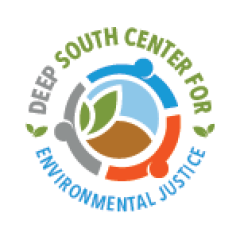
May 12, 2023
Deep South Center for Environmental Justice on the Environmental Protection Agency’s New Proposed Climate Pollution Limits
May 12, 2023 Deep South Center for Environmental Justice on the Environmental Protection Agency’s New Proposed Climate Pollution Limits NEW ORLEANS, LA - Following yesterday’s news of the EPA’s newly proposed pollution limits, Dr. Beverly Wright, Founding Executive Director of the Deep South Center for Environmental Justice, released the following statement: “The steps the EPA is taking to limit deadly pollution from power plants are bold and necessary. The communities on the fence line of these plants, in most cases communities of color, have been suffering for decades as the fossil fuel power industry has been able to legally poison the water they drink and the air they breathe. The fight for stronger regulation of these polluting industries has been our mission for more than 30 years and we’ve worked with countless community advocates whose work on the ground has led us to this moment. “In recent months, Administrator Michael Regan and the EPA have announced a string of new policies including proposed rules to strengthen standards on cancerous pollution and air quality standards. With each announcement, we are even more encouraged by the Biden Administration’s commitment to climate justice and protecting our fence-line communities. This is the type of action required to meet this moment in the crisis we are facing now.” ### About the Deep South Center for Environmental Justice Families in the Gulf Coast deserve to live in communities that are free from deadly air and are more resilient to climate change and extreme weather. The Deep South Center for Environmental Justice (DSCEJ) works to empower and engage communities to put environmental justice and equity at the center of all climate action. Led by environmental justice scholar and advocate, author, civic leader and professor of Sociology Dr. Beverly L. Wright, the DSCEJ uses research, education, and community and student engagement to advocate for policy change, lead health and safety training for environmental careers, develop social and emotional community wellness programs, and create new and environmentally healthy opportunities for the residents of communities disproportionately impacted by historic environmental injustice. ...

May 8, 2023
DSCEJ Unveils Updated Maps Showing Cancer Alley’s Impact on Black Communities
Deep South Center For Environmental Justice Unveils Updated Maps Showing Cancer Alley’s Impact on Black Communities New Report Illustrates Proximity of Petrochemical Facilities to Black Communities in the Mississippi River Chemical Corridor FOR IMMEDIATE RELEASE: May 8, 2023 Contact: Ginger LeBlanc | gingerl@dscej.org Valerie Keys | vkeys@skdknick.com NEW ORLEANS, LA – Today, the Deep South Center For Environmental Justice (DSCEJ) released a new report titled “The More Things Change, the More They Remain The Same: Living and Dying in Cancer Alley” updating the organization’s' 1990 mapping project that illustrates toxic pollution in relation to poverty and minority populations in the Mississippi River Chemical Corridor, also known as Cancer Alley. The corridor produces one-fifth of the United States’ petrochemicals and has transformed the region’s working-class communities into some of the poorest and sickest communities in Louisiana. The new maps show that, while the area has technically seen a decrease in greenhouse gases and total air emissions, the risk has grown exponentially for Black communities. The region's polluting facilities are concentrated almost exclusively in their backyards and environmental justice experts are now calling the region a “massive human experiment.” “The data we’ve gathered to update our 1990 maps illustrates what we’ve known to be true anecdotally – Cancer Alley is one of the deadliest regions in the country for Black people,” said Dr. Beverly Wright, Founder and Executive Director of DSCEJ. “We’ve found that the more things have changed in the last 30 years for so many, the more things stay the same for Black communities, and in many cases have gotten worse. We have to stop the construction of new petrochemical facilities and reduce the concentration of them in minority communities. It’s the only way to protect people going forward and make sure that the suffering we’ve had to endure for decades does not continue.” DSCEJ’S updated maps show Cancer Alley has 170 petrochemical facilities reporting toxic chemical emissions and 149 reporting greenhouse gas emissions.The number of facilities is only growing, with 29 in the proposal stage or currently under construction, all in majority Black communities. DSCEJ also factored in the growing cancer risk in the region with the exposure to these chemicals putting the area in the 80 to 90th and 95 to 100th percentile of cancer risk in the nation. In September 2022, DSCEJ joined forces with local groups as part of the Beyond Petrochemicals campaign, Bloomberg Philanthropies’ $85 million effort to stop the expansion of more than 120 petrochemical plants in Louisiana, Texas and the Ohio River Valley. “Fossil fuel pollution has degraded the lands and lives of Black and brown people for far too long – the time for accountability is now, ” said Heather McTeer Toney, Executive Director of the Beyond Petrochemicals Campaign. “Communities of color deserve the same access to clean air, water, and soil afforded to wealthier, white communities. The maps provided by Deep South Center for Environmental Justice showcase that there is much work to be done to achieve equity. With the decades-long, historical patterns of racial injustice in Louisiana’s ‘Cancer Alley’ exposed, we are inspired to put our resources to work to safeguard local communities and finally put an end to the expansion of the toxic petrochemicals industry.” The new report is supported by Bloomberg Philanthropies’ Beyond Petrochemicals campaign. Click here to view the report and here to view the executive summary. ### About the Deep South Center for Environmental Justice Families in the Gulf Coast deserve to live in communities that are free from deadly air and are more resilient to climate change and extreme weather. The Deep South Center for Environmental Justice (DSCEJ) works to empower and engage communities to put environmental justice and equity at the center of all climate action. Led by environmental justice scholar and advocate, author, civic leader and professor of Sociology Dr. Beverly L. Wright, the DSCEJ uses research, education, and community and student engagement to advocate for policy change, lead health and safety training for environmental careers, develop social and emotional community wellness programs, and create new and environmentally healthy opportunities for the residents of communities disproportionately impacted by historic environmental injustice. ...

Apr 21, 2023
ICYMI: President Biden Signs Executive Order Renewing the Federal Government’s Commitment to Advancing Environmental Justice
ICYMI: President Biden Signs Executive Order Renewing the Federal Government’s Commitment to Advancing Environmental Justice FOR IMMEDIATE RELEASE: April 21, 2023 Contact: Ginger LeBlanc | gingerl@dscej.org Valerie Keys | vkeys@skdknick.com (New Orleans, LA) – Today, President Biden signed a new Executive Order, Revitalizing Our Nation’s Commitment to Environmental Justice for All, that will revitalize the federal government’s commitment to addressing historical environmental injustices. This executive order will establish the White House Office on Environmental Justice, which will oversee and coordinate the federal government's efforts to address and aid communities so as to promote access to clean air and water and protect overburdened communities that have been overexposed to pollution. “This executive order is a promise made and a promise kept by the Biden Administration. I was a part of the team that worked on the original executive order signed by President Bill Clinton in 1994. Although it was an historic step in the right direction, it lacked accountability measures to ensure its efficacy,” said Dr. Beverly Wright, Founder and Executive Director of the Deep South Center for Environmental Justice. “This new order strengthens the 1994 executive order by operationalizing and institutionalizing the recommendation within every level of the federal government. And to ensure accountability, each agency will report all progress made directly to the president. But, while today’s executive order is historic, much work must be done to achieve true environmental justice, including full implementation of Justice40 initiatives and funding the new Civilian Climate Corps to create a 21st-century energy workforce.” Additionally, the Executive Order will: Strengthen engagement with communities and mobilize federal agencies to confront existing and legacy barriers and injustices; Promote the latest science, data, and research, including on cumulative impacts; Increase accountability and transparency in federal environmental justice policy; Honor and build on the foundation of ongoing environmental justice work. READ THE EXECUTIVE ORDER FACT SHEET HERE ...
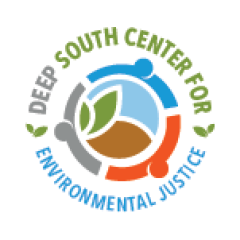
Apr 18, 2023
Deep South Center for Environmental Justice Selected as an Environmental Justice Thriving Communities Technical Assistance Center and Receives $10 Million Grant
For Immediate Release April 18, 2023 Contact: vkeys@skdknick.com Deep South Center for Environmental Justice Selected as an Environmental Justice Thriving Communities Technical Assistance Center and Receives $10 Million Grant New Orleans, LA - The Deep South Center for Environmental Justice (DSCEJ) is pleased to announce that it has been selected as an Environmental Justice Thriving Communities Technical Assistance Center (EJ TCTAC), by the U.S. Environmental Protection Agency (EPA) in partnership with the U.S. Department of Energy. The Center will receive a $10 million grant as part of President Biden’s Investing in America agenda which includes investments to advance environmental justice. As an EJ TCTAC, DSCEJ will help remove barriers and improve accessibility to federal resources for communities to address environmental justice issues. To help communities effectively manage grant funding, the Center will provide training, guidance, and other assistance on how to navigate federal grant application systems and how to write strong grant proposals. Additionally, EJ TCTACs will provide guidance on community engagement and meeting facilitation, including translation and interpretation services for limited English-speaking participants. Each technical assistance center will also create and manage communication channels to ensure all communities have direct access to resources and information. “We are thrilled to receive this grant and to be selected as one of only 17 Environmental Justice Thriving Communities Technical Assistance Centers in the country by the EPA and the Department of Energy,” said Dr. Beverly Wright, Executive Director of DSCEJ. “President Biden’s historic investments in environmental justice are a result of decades of advocacy by communities like ours in the Deep South and across the country. We are proud to be part of this effort, and look forward to helping break down these barriers to help our communities access the federal resources available to them so our children can grow up in an environment free from the dangers of pollution.” The full list of Environmental Justice Thriving Communities Technical Assistance Centers includes: University of Connecticut West Harlem Environmental Action, Inc. Inter-American University of Puerto Rico-Metro Campus National Wildlife Federation Deep South Center for Environmental Justice Research Triangle Institute Blacks in Green University of Minnesota New Mexico State University Wichita State University University of Arizona San Diego State University Willamette Partnership University of Washington In addition, EPA has selected three national EJ TCTACs that will provide additional assistance across the country, with particular capacity to assist Tribes, including: International City/County Management Association Institute for Sustainable Communities National Indian Health Board ### About the Deep South Center for Environmental Justice Families in the Gulf Coast deserve to live in communities that are free from deadly air and are more resilient to climate change and extreme weather. The Deep South Center for Environmental Justice (DSCEJ) works to empower and engage communities to put environmental justice and equity at the center of all climate action. Led by environmental justice scholar and advocate, author, civic leader and professor of Sociology Dr. Beverly L. Wright, the DSCEJ uses research, education, and community and student engagement to advocate for policy change, lead health and safety training for environmental careers, develop social and emotional community wellness programs, and create new and environmentally healthy opportunities for the residents of communities disproportionately impacted by historic environmental injustice. ...
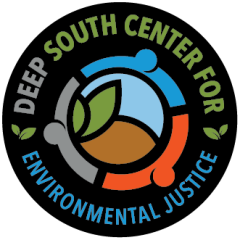
Apr 13, 2023
Deep South Center for Environmental Justice Receives $2.3 Million Grant from the Waverley Street Foundation
For Immediate Release April 13, 2023 Contact: vkeys@skdknick.com Deep South Center for Environmental Justice Receives $2.3 Million Grant from the Waverley Street Foundation (New Orleans, LA) The Deep South Center for Environmental Justice (DSCEJ) is pleased to announce that it has been awarded a $2.3 million dollar grant from the Waverley Foundation. This grant will help support DSCEJ’s core mission including our research, policy, and advocacy initiatives. As part of their commitment to invest in Black, brown, and Indigenous organizations and support local solutions, the Waverley Foundation selected DSCEJ as a Climate Hubs partner. Climate Hubs partners were selected to strategically foster place-based partnerships, primarily between minority-serving institutions like historically Black colleges and universities (HBCUs), Hispanic serving institutions (HSIs) and tribal colleges and universities (TCUs), and community-based organizations that advance equitable climate strategies. As a Climate Hub partner, DSCEJ will help facilitate collaboration between higher education institutions that specialize in scientific research, policy experimentation, and the education of future leaders and local grassroots partners. This collaboration will not only help DSCEJ continue to be a leader in the U.S. Environmental Justice movement, but also allow the Center to develop the next diverse generation of climate change activists. “We are thrilled to receive this grant and to be chosen as a Climate Hubs Partner by the Waverley Street Foundation,” said Dr. Beverly Wright, Executive Director of DSCEJ. “This funding will help The Center continue to identify and meet the needs of our local community through research, outreach, and training. With the support of the Waverley Street Foundation, along with our HBCU Climate Change Consortium, we can continue to shape the next generation of environmental leaders who will seek environmental, climate, and economic justice for Black and Brown communities in the Mississippi River Chemical Corridor and Gulf Coast region.” “Institutions led by and designed to serve people of color, like historically black colleges and universities and tribal colleges, have long supported communities while preparing future generations with an intersectional lens to advance societal change,” said Alexandria McBride, Strategy Director for Waverley Street Foundation. “The time is now and this is the expertise we must support as we invest in our climate future.” Other Climate Hubs Partners include: Bullard Center for Environmental and Climate Justice at Texas Southern University Center for Diverse Leadership in Science at UCLA CUNY Ecotrust The Environmental Collaboratory at Drexel University Florida A&M University New York City Environmental Justice Alliance Salish Kootenai College Second Nature Tishman Environment and Design Center United Negro College Fund University of Maryland – College Park’s Center for Community Engagement, Environmental Justice and Health About the Deep South Center for Environmental Justice Families in the Gulf Coast deserve to live in communities that are free from deadly air and are more resilient to climate change and extreme weather. The Deep South Center for Environmental Justice (DSCEJ) works to empower and engage communities to put environmental justice and equity at the center of all climate action. Led by environmental justice scholar and advocate, author, civic leader and professor of Sociology Dr. Beverly L. Wright, the DSCEJ uses research, education, and community and student engagement to advocate for policy change, lead health and safety training for environmental careers, develop social and emotional community wellness programs, and create new and environmentally healthy opportunities for the residents of communities disproportionately impacted by historic environmental injustice. About Waverley Street Foundation The voices, experiences, and innovations of communities around the world have a central place in protecting people, nature, health, and our planet. Waverley Street Foundation, a 501(c)(3) nonprofit, supports farmers, students, Indigenous peoples, advocates, and many others working in the places they call home. Waverley Street has committed to spend the entirety of its endowment — more than $3 billion as of 2022 — by 2035 to support organizations working on solutions at the intersection of climate change and community priorities. https://www.waverleystreet.org/ ...

Apr 6, 2023
Statement from the Deep South Center for Environmental Justice on EPA’s Proposed Rule to Strengthen Standards and Reduce Cancer Risks from Toxic Pollution
For Immediate Release April 6, 2022 Contact: vkeys@skdknick.com Statement from the Deep South Center for Environmental Justice on EPA’s Proposed Rule to Strengthen Standards and Reduce Cancer Risks from Toxic Pollution New Orleans, LA -- In response to the Environmental Protection Agency’s (EPA) proposed rule to strengthen standards that would significantly reduce hazardous air pollutants from chemical plants, specifically the cancerous chemicals that have devastated communities in Cancer Alley, Dr. Beverly Wright, Executive Director of the Deep South Center for Environmental Justice, released the following statement: “The Deep South Center for Environmental Justice is deeply satisfied with the steps the EPA is taking to reduce the amount of deadly pollution produced by chemical plants. This proposed rule to update several regulations that apply to chemical plants requiring them to monitor levels of highly toxic and cancerous chemicals entering the air in fence-line communities is the most significant rule I have seen in my 30 years of experience working in Cancer Alley. “For the entirety of my environmental justice career, I have never been able to comprehend how it is possible that industrial facilities are able to poison our air, water, and soil – making people sick and in some cases dying – and not be held accountable for it. The regulations have been set in a way that made it legal through the permitting process to poison us. “For decades regulating agencies have completely abdicated their responsibility to the communities they are supposed to protect. Unfortunately, that meant generations of families losing loved ones to cancer and fighting it themselves. There is no doubt that the rule EPA is proposing today will save lives. “During his Journey to Justice tour in Louisiana, Administrator Regan spoke directly with suffering people and saw firsthand what they go through daily. He promised to go back to Washington and do something about it. Today is the result of an administration finally listening to what communities say about how to fix this crisis. This has been and continues to be the fight of our lives, but today is a day to celebrate.” ### About the Deep South Center for Environmental Justice Families in the Gulf Coast deserve to live in communities that are free from deadly air and are more resilient to climate change and extreme weather. The Deep South Center for Environmental Justice (DSCEJ) works to empower and engage communities to put environmental justice and equity at the center of all climate action. Led by environmental justice scholar and advocate, author, civic leader, and professor of Sociology Dr. Beverly L. Wright, the DSCEJ uses research, education, and community and student engagement to advocate for policy change, lead health and safety training for environmental careers, develop social and emotional community wellness programs, and create new and environmentally healthy opportunities for the residents of communities disproportionately impacted by historic environmental injustice ...
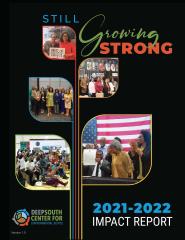
Mar 22, 2023
Deep South Center for Environmental Justice Releases Two-Year Impact Report
Deep South Center for Environmental Justice Releases Two-Year Impact Report Report Illustrates The Center’s Community-Centered Efforts Throughout 2021 and 2022 FOR IMMEDIATE RELEASE: March 22, 2023 Contact: Ginger LeBlanc | gingerl@dscej.org Valerie Keys | vkeys@skdknick.com New Orleans, LA -- Today, the Deep South Center for Environmental Justice (DSCEJ) released its two-year impact report highlighting the organization’s community-centered work through 2021 and 2022. DSCEJ’s efforts to empower communities historically impacted by environmental racism, promote community-led solutions to the climate crisis and put environmental justice at the center of all climate action were bolstered by philanthropic funding and high-profile engagements with federal, state, and local lawmakers. The DSCEJ’s 2021-2022 Impact Report can be found here. In 2021, Dr. Beverly Wright, Executive Director and Founder of The Deep South Center for Environmental Justice was appointed to the Biden Administration’s White House Environmental Justice Advisory Council and charged with providing recommendations on how to address current and historic environmental injustice to the White House Environmental Justice Interagency Council (IAC) and the Chair of the White House Council on Environmental Quality (CEQ). This appointment provided Dr. Wright and DSCEJ with a platform to ensure the priorities of environmental justice communities are being addressed in Washington. The administration’s commitment to environmental justice kicked off with the announcement of Justice40, a whole-of-government approach to embedding environmental justice in the operations of the federal government by requiring that historically disadvantaged communities receive 40 percent of federal investments in clean energy solutions. The administration followed with various engagements with DSCEJ, including EPA Administrator Michael Regan’s Journey to Justice tour. Backed by community advocates, DSCEJ helped to organize a “toxic tour” throughout Cancer Alley, an 85-mile corridor along the Mississippi River lined with over 150 petrochemical plants and 7 oil refineries. Administrator Regan received an immersive tour that brought him face to face with the devastating effects of living with high polluting industries in your backyard. Following Administrator Regan’s visit, the EPA has issued enforcement actions to help address air pollution, unsafe drinking water, and additional issues. As part of his commitment, in September 2022, the EPA announced the creation of the Office of Environmental Justice and External Civil Rights, to help better advance environmental justice by enforcing civil rights laws in overburdened communities and providing new grants and technical assistance. Earlier this year the EPA announced a tighter national ambient air quality standard (NAAQS) for a fine particle pollution also known as PM2.5.Black communities are exposed to PM2.5 air 1.54 times higher than the rest of the population. In February 2023, the EPA and Department of Justice took a monumental step and filed a lawsuit to compel Denka, a major producer of neoprene synthetic rubber in the Cancer Alley corridor, to cut down its carcinogenic emissions to EPA-safe levels. DSCEJ’s efforts and Dr. Wright’s recommendations as a member of WHEJAC also influenced the Inflation Reduction Act which included historic investments in environmental justice communities made possible by decades of community advocacy and took a big step toward realizing the environmental justice movement’s priorities. In November 2022, DSCEJ partnered with WE ACT for Environmental Justice, the Bullard Center for Environmental and Climate Justice at Texas Southern University, along with other international partners to debut the first-ever Climate Justice Pavilion in the Blue Zone at COP27 in Sharm El-Sheikh, Egypt. Supported by 11 major sponsors, the Climate Justice Pavilion brought together representatives from the Global South, the U.S. Environmental Justice Movement, and Indigenous peoples to spotlight the voices of communities disproportionately impacted by climate change on a global stage. “I am so proud of what DSCEJ has been able to achieve in the last two years and grateful for the new and legacy funding relationships that have sustained our work,” said Dr. Beverly Wright, Executive Director and Founder of the Deep South Center for Environmental Justice. “From Administrator Regan’s Journey to Justice tour to hosting the very first Climate Justice Pavilion at COP27, we have made historical steps toward realizing environmental justice, but we still have a ways to go. We are already planning our strategies for the future with our community partners by our side, and we look forward to future engagement with lawmakers in the deep South, Washington, and across the country. We will continue to empower our climate-vulnerable communities to take bold action to ensure that future generations can thrive in a healthy and just environment.” About the Deep South Center for Environmental Justice Families in the Gulf Coast deserve to live in communities that are free from deadly air and are more resilient to climate change and extreme weather. The Deep South Center for Environmental Justice (DSCEJ) works to empower and engage communities to put environmental justice and equity at the center of all climate action. Led by environmental justice scholar and advocate, author, civic leader and professor of Sociology Dr. Beverly L. Wright, the DSCEJ uses research, education, and community and student engagement to advocate for policy change, lead health and safety training for environmental careers, develop social and emotional community wellness programs, and create new and environmentally healthy opportunities for the residents of communities disproportionately impacted by historic environmental injustice. # # # ...

Mar 16, 2023
HBCU Climate and Environmental Justice Screening Tool launches for Justice40 Hubs at Texas Southern University
HBCU Climate and Environmental Justice Screening Tool launches for Justice40 Hubs at Texas Southern University FOR IMMEDIATE RELEASE: February 16, 2023 Contact: Ginger LeBlanc | gingerl@dscej.org Valerie Keys | vkeys@skdknick.com Briana Augustus | briana.augustus@tsu.edu HOUSTON, TX - Dr. Robert D. Bullard of the Bullard Center for Environmental and Climate Justice at Texas Southern University and Dr. Beverly Wright of the Deep South Center for Environmental Justice are continuing their collaboration for the just implementation of President Biden’s Justice40 Initiative with the launch of the HBCU Climate and Environmental Justice Screening Tool (HCEJST). The Bullard Center convened a team of data and GIS experts from HBCUs led by Dr. David Padgett, to develop the HCEJST to supplement the government screening tool that excludes race. The experts are part of the Bullard Center, Deep South Center and HBCU Consortium Technical Support Team (TST). This team will be conducting training on the government CEJST and the HCEJST with 21 Justice40 hubs from 10 states to help them better understand how environmental data is collected. On Tuesday, March 21, 2023, Drs. Bullard, Wright and Padgett will be available to speak with the press about the launch of the HCEJST tool prior to presenting it to J40 Hubs. Media is invited to see the tool in action to get a better understanding of its purpose. WHO: Dr. Robert D. Bullard of the Bullard Center for Environmental and Climate Justice at Texas Southern University and Dr. Beverly Wright of the Deep South Center for Environmental Justice WHAT: Justice40 Initiative HCEJST Tool Launch WHEN: Tuesday, March 21, 2023, 11:00 AM CT/ 12:00 PM ET WHERE: The Sterling Student Life Center, President’s Lounge, 4th Floor Texas Southern University 3100 Cleburne Street, Houston, TX 77004 Media Coverage: Media planning to attend in person are encouraged to RSVP by 12 P.M. on Monday, March 20, 2023. RSVP to briana.augustus@tsu.edu or (225) 588-5986. About the Bullard Center for Environmental and Climate Justice The Robert D. Bullard Center for Environmental and Climate Justice at Texas Southern University was launched in 2021 to address long standing issues of systemic inequality and structural racism that cause disproportionate pain, suffering and death in Black and other people of color communities. The Bullard Center works to promote environmental, climate, economic, energy, transportation, food and water and health justice. Texas Southern University is a student-centered comprehensive doctoral university committed to ensuring equality, offering innovative programs that are responsive to its urban setting, and transforming diverse students into lifelong learners, engaged citizens, and creative leaders in their local, national, and global communities. About the Deep South Center for Environmental Justice Families in the Gulf Coast deserve to live in communities that are free from deadly air and are more resilient to climate change and extreme weather. The Deep South Center for Environmental Justice (DSCEJ) works to empower and engage communities to put environmental justice and equity at the center of all climate action. Led by environmental justice scholar and advocate, author, civic leader and professor of Sociology Dr. Beverly L. Wright, the DSCEJ uses research, education, and community and student engagement to advocate for policy change, lead health and safety training for environmental careers, develop social and emotional community wellness programs, and create new and environmentally healthy opportunities for the residents of communities disproportionately impacted by historic environmental injustice. ...

Mar 15, 2023
Statement from the Deep South Center for Environmental Justice on President Biden’s 2024 Budget Proposal
Statement from the Deep South Center for Environmental Justice on President Biden’s 2024 Budget Proposal New Orleans, LA -- In response to President Biden’s budget proposal, Dr. Beverly Wright, Executive Director of the Deep South Center for Environmental Justice, released the following statement: “All communities deserve to live and thrive in an environment free from deadly air and resilient to climate change and extreme weather. For too long, generations of Black and Brown communities have been forced to live next door to deadly chemical plants, breathe polluted air, and drink unhealthy water. The President’s budget is serious about tackling these issues and aligning policies across the federal government to create new and environmentally healthy ones to improve the lives of communities disproportionately impacted by historic environmental injustice. “The proposed budget makes significant investments in workforce development and reducing global warming by cutting greenhouse gas emissions by 50 percent by 2030. Funding these priorities will not only reverse decades of harmful environmental policies, but strengthen communities, making them healthier and safer with good job opportunities for generations to come. “We are especially pleased to see continued funding for Justice40 priorities, which will give us additional opportunities to engage, enlighten and empower communities directly affected by deadly pollution and severe weather events and continue fighting for formative change. This additional funding will strengthen our efforts to link the most overburdened communities to resources that exist for years to come. “Today the President reiterated his administration’s commitment to environmentally just policies and we look forward to working with Congress and the administration to turn this funding request into a funding reality.” ### About the Deep South Center for Environmental Justice Families in the Gulf Coast deserve to live in communities that are free from deadly air and are more resilient to climate change and extreme weather. The Deep South Center for Environmental Justice (DSCEJ) works to empower and engage communities to put environmental justice and equity at the center of all climate action. Led by environmental justice scholar and advocate, author, civic leader and professor of Sociology Dr. Beverly L. Wright, the DSCEJ uses research, education, and community and student engagement to advocate for policy change, lead health and safety training for environmental careers, develop social and emotional community wellness programs, and create new and environmentally healthy opportunities for the residents of communities disproportionately impacted by historic environmental injustice. ...